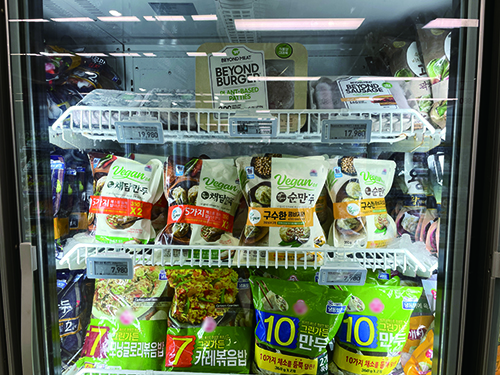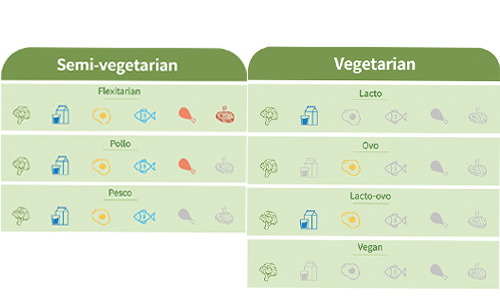Practicing a vegetarian diet is a way to save the environment
 Various food products, which are made of meat analouges, are being sold on supermarkets. /Photography by Lee Jae-eun |
Eating meat provides various types of nutrition such as protein, amino acids, and collagen essential for human lives. As the demand for meat has steadily increased, meat consumption has also risen. Eating meat makes people happy, but the method of farming it causes global warming. Since Korea is changing to a subtropical climate, the range of temperatures is increasing. Therefore, many argue that meat consumption should be reduced to prevent global warming, and the number of people who choose to eat less meat is increasing. Currently, because of global warming the world is undergoing abnormal weather disasters such as heatwaves, heavy rain, and forest fires. Especially, floods hit Western Europe and China on July, and heat waves hit Canada, bringing loss of lives. So then, how is the meat consumption affecting global warming, and what efforts are being made to reduce consumption?
Meat consumption leads to destruction of the environment
Since animal domestication has developed, humans have been able to produce a mass amount of meat using slaughterhouses to satisfy the growing demand. Meat, which is composed mainly of water, protein, and fat, is usually eaten after cooking and seasoning. People regularly eat meat as it is nutritious and has good taste. According to the data of per capita consumption of meat worldwide from 2018 to 2020, which was released by Statista on July 2021, North America is the continent that consumed the most meat per person over three years, recording 97.5kg. It is followed by Oceania (74.66kg), Europe (63.5kg), Latin America (60.91kg), and Asia (26.61kg). In Korea, meat consumption is also increasing continuously. According to the Korea Rural Economic Institute (KREI), Korea’s per capita meat consumption, which was 31.9kg in 2000, rose 2.9% annually, and it rated 54.6kg in 2019. Suppliers are producing large amounts of meat to fulfill the high demand.
A carnivorous diet helps maintain health as people can obtain essential nutrients. However, the problem of the current carnivorous diet is that people are consuming excessive amounts of meat. With the prevalence of meat-oriented diets, people are exceeding the appropriate amount of meat consumption. As a result, health problems such as obesity and high blood pressure are increasing in Korea. Although health problems caused by meat should be resolved, the more urgent problem due to excessive meat intake is that many countries are suffering from global warming. In growing livestock, a huge amount of plants are required to feed them, leading to severe environmental pollution. According to the Water Footprint Network, a non-profit foundation that calculates the amount of water used to produce resources, to produce 1kg of meat, 4,325L of water is needed for chicken, 5,988L for pork, 8,763L for lamb, and 15,415L for beef. Considering that the water needed for vegetables and grains are 322L and 1,644L, the waste of water for meat production is serious. The total annual water usage for animal breeding and production is 2,422 gigameters. Moreover, according to the report of the Food and Agriculture Organization of the United Nations (FAO), the amount of greenhouse gases generated in the livestock industry accounts for 16.5% of total emissions. Especially, methane gas, which is generated in the process of raising cattle, is a greenhouse gas that heats the Earth. Greenhouse gas needs to be reduced to protect the environment.
Ecological vegetarianism is the way to coexist with the Earth
People’s perception of the climate crisis has increased as they are experiencing abnormal weather disasters caused by global warming. According to the survey conducted by Gallup Korea and Win, an international market research institution, on June 2021, 85% of adults in 34 countries including Korea answered that global warming is a critical threat to humanity. As a result, ecological conscience is drawing attention to Earth protection.
Ecologism has emerged to contemplate the nature destroyed by the development of capitalism and suggest alternatives to solve environmental pollution problems in modern society, based on the self-reflection of anthropocentrism. Ecologists criticize the unilaterality of humans, which does not consider nature and living things when producing resources. They point out that humans should be in harmony with the nature as they are part of it. In addition, ecologists argue that protection of animal rights is needed for livestock that is slaughtered in unethical ways. In the respect of ecological perspective, vegetarianism, which means eating vegetables rather than eating animal foods produced in inhumane ways, is necessary.
Interestingly, vegetarians are divided into a few types. According to the Korea Vegetable Vegan Association (KVVA), people who practice a vegetarian diet is divided into semi-vegetarian and vegetarian. It is also classified in details of food allowed to eat for each type. Semi-vegetarian is divided into Pollo, Pesco and Flexitarian. Also, vegetarian is divided into Lacto, Ovo, Lacto-ovo and Vegan. Semi-vegetarian aims to minimize meat consumption, and vegetarian aims to minimize the consumption of food containing animal ingredients including not only meat but also dairy products and eggs.
 Various food products, which are made of meat analouges, are being sold on supermarkets. /Photography by Lee Jae-eun |
Individuals and societies are practicing a vegetarian diet
Currently, as meat consumption is cited as one of the leading causes of environmental pollution, behavioral changes to practice vegetarianism are being made at the individual and social levels. In particular, the number of flexitarians who do meat diet and vegetarian diet simultaneously is increasing. Flexitarian is a combined word of flexible and vegetarian, which means being flexible in practicing a vegetarian diet depending on the situation due to realistic constraints that make it difficult to keep the rules strictly. The Korea Vegan Union (KVU) said that the number of vegetarian people in Korea is estimated to be 15 million in 2020, which has increased tenfold from 1.5 million in 2008.
Kim Sun-hwa (27), Ovo Vegetarian
Q1. What type of vegetarianism are you currently practicing?
A. I am practicing Ovo, a type of vegetarianism that does not allow a meat diet. I am trying not to eat meat and dairy products. Instead, I am eating vegetables and eggs most days. Dining together, which is inevitable, is the only situation when I eat meats.
Q2. What motivated you to start eating vegetables rather than meats?
A. I decided to practice vegetarianism when I saw Greta Thunberg, a Swedish environmental activist, insisting that people should reduce meat consumption. Also, a video showing a meat production process affected me to choose vegetarianism due to its cruelty.
Q3. Is there a difference since you started vegetarianism?
A. My health has improved since I started eating vegetables. When I ate meat, skin problems due to carnivores bothered me, but after practicing vegetarianism, my skin became clean and I feel much refreshed. Moreover, I felt proud that I can help protecting the environment by changing my eating habits. As the abnormal climates become more serious, more people around me are trying to follow vegetarianism.
Meat consumption is changing at the personal level and at the social level, and efforts to practice vegetarianism in daily life are continuing. Currently, several schools across the country are leading a new culture of school meals by designating a vegetarian day and providing vegetarian meals once or twice a month. In particular, the Seoul Metropolitan Office of Education pointed out that excessive meat-centered eating habits are the cause of global warming. Therefore, they decided to provide vegetarian meals starting from April to protect the environment by reducing meat consumption. They are now operating “Green School Day” twice a month. In addition to providing a vegetarian meal by designating a day of vegetarianism, voices are growing that vegetarian diets should be guaranteed for meal options due to self-determination, freedom of conscience, and the right to pursue one’s happiness.
A vegetarian diet to protect the environment can be easily found throughout the world. All public schools in New York City are attempting to reduce the risk of global warming due to livestock farming by implementing “Meat Free Monday” from 2019. The French parliament passed a bill of climate restoration that obligates schools to provide vegetarian meals at least once a week. All schools in France are expected to present a meal that excludes meat and seafood once a week beginning on November 2021.
A vegetable diet culture, which was previously a niche lifestyle, is gradually becoming mainstream as products for vegetarians can be easily found in daily life. Vegetarianism turned into a real-life diet as meat-centered industries are now supplying vegetarian foods. The most notable aspect of the current vegetarianism industry are meat analogues. They are meat-like substances made from vegetarian ingredients such as soybeans, which can guarantee animal rights while minimizing environmental pollution. E-mart, Shinsegae’s food brand, made vegetarian zones in 23 stores nationwide and is selling frozen food made of vegetable ingredients. Vegetarian product is now easy to find not only in supermarkets but also in convenience stores, which have high accessibility. One of the popular convenience stores, CU, has started selling vegetarian lunch boxes with a meat analogue made of beans. In addition, No Brand Burger has also launched a nugget using mycoprotein derived from microorganisms, which is a substitute substance for chicken. As it became more accessible for consumers to experience meat analogues in different ways, awareness of vegetarianism is changing.
In the past, vegetable diet culture was not popular. However, as the problem of environmental pollution caused by excessive meat consumption has emerged, the number of vegetarians who reject eating meat to save nature is increasing. This is expected to change the existing meat-centered dietary culture. Kim said, “Vegetarians are struggling as the range of products they can choose is still narrow. However, the demand for vegetarianism is growing, and the vegetable diet culture is becoming prominent in our society. I hope that the ecological vegetarianism, which is being prevalent, can protect the environment and help us coexist with nature.”

